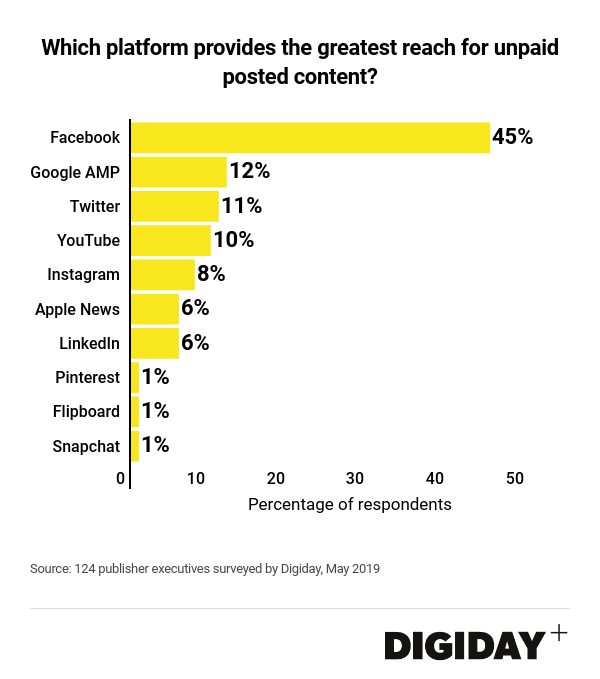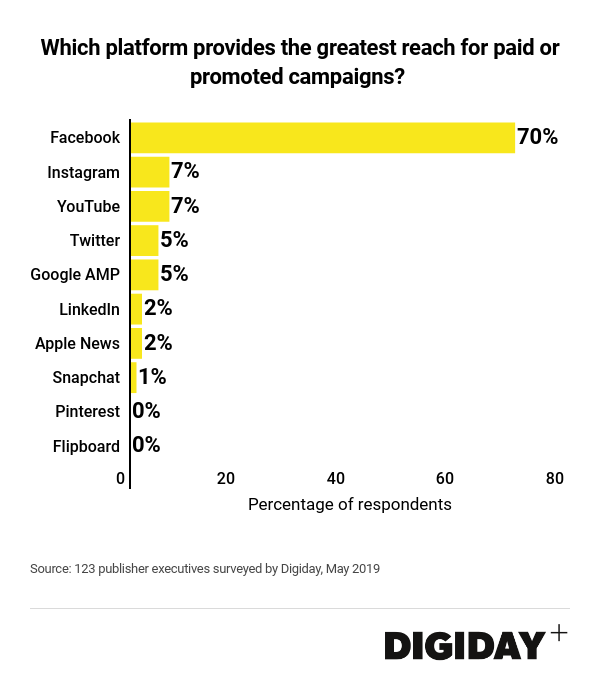Secure your place at the Digiday Media Buying Summit in Nashville, March 2-4
Digiday Research: Facebook still delivers the greatest reach for publisher content
This research is based on unique data collected from our proprietary audience of publisher, agency, brand and tech insiders. It’s available to Digiday+ members. More from the series →
Some publishers panicked when Facebook announced it was going to limit the amount of their content shown in the newsfeed at the start of last year. Many of those reliant on the platform to generate began looking to other platforms like Twitter, Snapchat and Apple News instead. But almost a year and a half later, and despite a significant slowdown in the volume of publisher content in places in front of its users, Facebook still provides the greatest reach for publishers’ content compared to other social platforms, according to Digiday research.
In a survey of 124 publisher executives conducted by Digiday this May, 45% of respondents said Facebook delivered the best reach for unpaid or organically posted content, more than any other platform. Trailing Facebook was Twitter, YouTube and Instagram, each with around 10% of the vote.
When it comes to which platform provides the greatest reach for paid content, Facebook is even farther ahead of its platform peers. Seventy-percent of publisher respondents said Facebook achieved the greatest reach for paid or sponsored content. Instagram and YouTube were second and third best platforms for paid content, each selected by 7% of respondents.
Despite Facebook throttling the reach of publishers’ organic posts, some publishers are still finding success reaching new audiences on the platform. “We’ve actually grown our reach significantly on Facebook since the initial algorithm change,” said Emily Cohn, executive growth editor at Insider Inc. “Good stories that are worth sharing still do incredibly well on that platform,” she added.
Daniel Hallac, chief product officer at New York Media said that after Facebook changed its newsfeed, referral traffic dropped 20% almost immediately but has since rebounded. “My thesis why we were not hit badly is that a lot of our Facebook reach is purely organic from people just sharing good content. It’s not from our coming from our pages,” said Hallac.
Hallac added “The Facebook apocalypse only hurt publishers that gamed the algorithm. It’s still our most important social platform in terms of our ability to reach our audience.”
Facebook also has the obvious advantage of scale on its side. With billions of active users — more than Twitter, Snapchat and Apple News combined.
However, other platforms continue to play an important role in publishers’ social strategies. “LinkedIn is a really great platform for us because our content resonates on it,” said Cohn. “Part of that is because of its algorithm, but again, it’s because it’s great content worth engaging with,” she added.
Other publishers like the BBC have also been crafting their LinkedIn strategies. Meanwhile, Twitter is incentivizing publishers to use its platform more by increasing its ad payments to publishers.
Hallac found that some of New York Magazine’s biggest successes off Facebook have come from Apple News and Snapchat. “With Snapchat, it varies, but sometimes we’re reaching more people there per month than on Facebook,” he said.

For publishers paying to promote content, Facebook “is the only game in town” for publishers trying to effectively and quickly buy reach, according to one publisher who recently spoke with Digiday.
However, rising costs for paid content on Facebook means the platform is not what it used to be for publishers. “Facebook still provides the best bang for your buck. But the ROI has become much more difficult,” said Hallac.
One publisher executive commented, “Outside of Facebook if a publisher is interested in paying for reach, there are not any real alternatives.”

More in Media

Media Briefing: Turning scraped content into paid assets — Amazon and Microsoft build AI marketplaces
Amazon plans an AI content marketplace to join Microsoft’s efforts and pay publishers — but it relies on AI com stop scraping for free.

Overheard at the Digiday AI Marketing Strategies event
Marketers, brands, and tech companies chat in-person at Digiday’s AI Marketing Strategies event about internal friction, how best to use AI tools, and more.

Digiday+ Research: Dow Jones, Business Insider and other publishers on AI-driven search
This report explores how publishers are navigating search as AI reshapes how people access information and how publishers monetize content.





